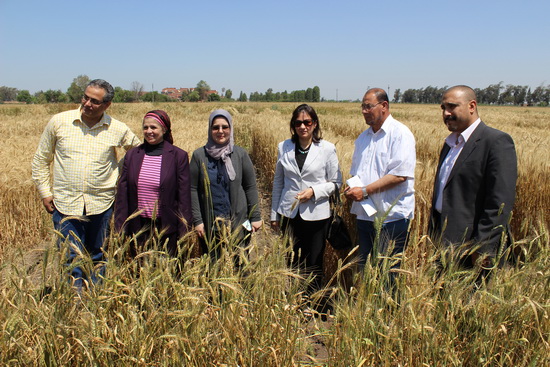May 20, 2015
Source: Crop Biotech Update

EBIC team, Director of AGERI and researchers from AGERI and Cairo University organized a workshop at Gemiza station where there are on-going field trials of transgenic wheat plants. More than 120 farmers, researchers and students attended the workshop.
The president of the Gemiza Station Dr. Hosam Eldien Awad opened the workshop with a welcome presentation followed by Dr. Shireen Assem, Director of AGERI where she presented the different activities carried out at AGERI. Prof. Naglaa Abdallah, Director of EBIC gave a presentation on the importance of the application of biotech crops, where Egypt stands compared to the regional countries and the future prospective of using these technologies. Dr. Hala Eissa and Dr. Mostafa Elshamy presented their work in developing transgenic wheat plants with fungal tolerance. They stated that there is a strong relation between the expression of the transgene, identified by RT-PCR and symptom appearance.
The discussion was very fruitful and it was recommended to use experimental stations for the development of transgenic plants for disseminating information, and to invite farmers and decision makers to visit these stations, as a "seeing is believing" exercise.
Following the workshop, field visit was carried out to the transgenic plants wheat plants with fungal rust and powdery mildew resistance. The wheat cultivar Highlight was transformed using the barley chitinase gene to acquire the plant's resistance against fungi, especially rust. During the first field visit in March, plants were still green and the symptoms were very obvious on nontransgenic plants. In May, wheat fields were highly infected with the strong yellow rust isolate in Africa, UG99. However, transgenic lines showed different degrees of tolerance to fungal infection. These lines were scored and the homozygote line with the highest degree was recorded and will be used in the breeding programs with the Egyptian cultivars. Farmers were impressed with the high degree of tolerance to the infection and they support using these plants in the future.
For more updates about biotechnology in Egypt, visit EBIC's website or contact Naglaa Abdallah at naglaa_a@hotmail.com.